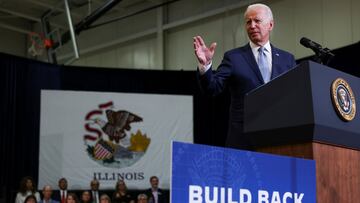$3000/$3600 Child Tax Credit: Will President Biden extend it to 2025?
With the credit scheduled to begin July 15, the Biden administration will face plenty of challenges in achieving their long-term aim.


With the credit scheduled to begin July 15, the Biden administration will face plenty of challenges in achieving their long-term aim of extending it to 2025.
As the US climbs out of the covid-19 depression, President Biden is trying to secure both the recovery of his nation and his legacy as President. Coupled with the unemployment benefits, that for many are soon to end in many states, the Child Tax Credits are one of the President’s main weapons in his arsenal to get the country back on its feet.
And while they are confirmed for the 2021 fiscal year, there is some doubt over whether President Biden can convince his political opponents to support the credits through to his target of 2025.
Why does President Biden want the Tax Credit to last until 2025?
In his June 21 statement concerning Child Tax Credit, President Biden argued:
“This tax cut will give our nation’s hardworking families with children a little more breathing room when it comes to putting food on the table, paying the bills, and making ends meet.”
Supporters of the credit are optimistic that it will have a positive impact on both middle- and lower-income families.
Indeed, researchers at Columbia University’s Center on Poverty and Social Policy are estimating that this new credit could cut childhood poverty by 45%.
But if the Tax Credit fails to last until 2025 then this number will be drastically lower.
What problems is the President facing in achieving this?
If it were part of a bipartisan bill...
House Republicans have already said they will not support Biden’s $1.9 trillion-dollar covid-19 rescue plan, arguing that the previous funding given the pandemic should be continued or any new bill should be less expensive.
Republicans and liberal economists alike warned the Democrats’ $1.9 trillion so-called ‘COVID bill’ could cause inflation that would hurt ordinary American families.
— Leader McConnell (@LeaderMcConnell) May 28, 2021
Fast forward: We just got the most dramatic monthly inflation report in decades. pic.twitter.com/K9ewBAqabG
House Republican leader Mitch McConnell says that support for Americans should be targeted rather than given out to all families.
However, as ever with targeted relief, families will inevitably fall through gaps in the system and miss out on benefits that they are entitled to.
If the President wants to make sure that the bill is passed with support from both Democrats and Republicans, it is very likely that elements of it will need to made palatable to Republicans. Hopeful extensions until 2025 may need to be reduced or parts of the bill outright removed.
If Democrats attempted to pass the bill alone...
With a 50-50 split between Democrats, including independents, and Republicans, a simple tie-breaking vote from Vice President Kamala Harris can advance legislation. Indeed, this was the tactic used to pass the first $1.9 trillion covid-19 relief package in March.
But this doesn't mean House Democrats would be united if such a bill were to be introduced later in the pandemic. Democrat Senator Joe Manchin demanded the initial relief bill in March be watered down and there is a risk progressives could push for more changes. All of this will be dependent on how quickly the US recovers from the pandemic. If it is faster than expected, the opposition to further huge spending will increase.
Even if the President may not have to deal with the Republicans, there will still be much negotiating within his own party.
Who is eligible?
Related stories
The Americans Rescue Act expanded the Child Tax Credit significantly. Taxpayers with children ages 5 and under, will receive a credit of $ 3,600 per child. For children ages 6 to 17, that credit will be $3,000.
This means monthly payments of $250 or $300 depending on a child’s age.
Get help applying for the Child Tax Credit:
- Child Tax Credit 2021 on July 15th: how to prepare with the eligibility assistant
- IRS Child Tax Credit portal: how can I use it to opt out and what other uses does it have?
- $3,000/$3,600 Child Tax Credit: which families might need to opt out?
- When will the IRS start to send the $3,000/$3,600 Child Tax Credit payments?

